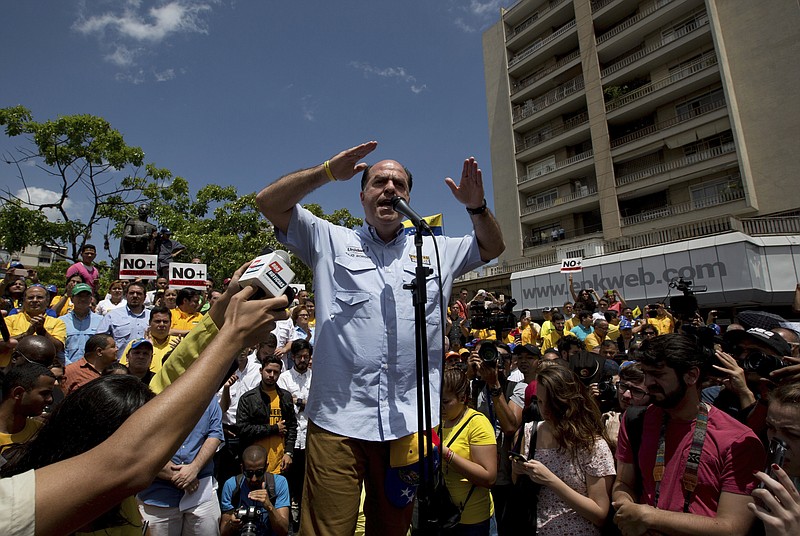CARACAS, Venezuela (AP) - The leader of Venezuela's rebellious congress has a message for the world's capitalists: Think twice before signing another check to President Nicolas Maduro's government.
Amid anti-Maduro protests roiling Venezuela, leading to 20 deaths and dozens of arrests the past three weeks, the opposition is trying to rally international opinion against his socialist government.
For his part, National Assembly President Julio Borges has sent more than a dozen letters to leading global banks warning them of the risk to their reputations and bottom line if they throw a lifeline to Maduro as he seeks to bolster an economy suffering widespread shortages of food and other goods while avoiding a default on foreign debt.
"The national government, through the central bank, is going to try to swap gold held as reserves for dollars to stay in power unconstitutionally," said one letter sent Thursday to John Cryan, the CEO of Deutsche Bank. "I have the obligation to warn you that by supporting such a gold swap you would be taking actions favoring a government that's been recognized as dictatorial by the international community."
The letters are intended to build on legislation recently passed by the opposition-controlled congress that nullifies any government debt issuances not explicitly approved by legislators, Borges said in an interview Friday.
Lost in the surge of protests triggered by last month's decision by the Venezuelan Supreme Court to strip congress of power is Maduro's desperate need for financing. The ruling, which was reversed after a storm of international criticism, arose from congress' refusal to approve a proposal allowing state-run oil giant PDVSA to form joint ventures with preferred foreign partners such as Russia's Rosneft.
Sitting atop the world's largest oil reserves, Venezuela has long been considered a reliable credit, managing to maintain its status as a Wall Street favorite even when the late President Hugo Chavez went on a nationalizing spree seizing factories and oil fields of major foreign companies like Exxon and Clorox. This week, General Motors became the latest major American brand to flee Venezuela after its assembly plant, bank accounts and other assets were seized as the result of a judicial ruling in favor of a former GM dealership.
But as crude oil prices have fallen since Maduro took office in 2013, the country's foreign currency reserves have plummeted to a 15-year low of $10 billion. About 75 percent of that is held in illiquid gold bars as a result of Chavez's fetish for bullion over the "imperialist" dollar. The country has debt payments still coming due this year of around $6 billion.
Yet, as the government scrounges for financing, it managed to donate $500,000 to President Donald Trump's inauguration events, through PDVSA's wholly owned U.S. subsidiary, Citgo, federal election records revealed this week.
Borges called the donation a "hypocritical" attempt by Maduro to curry favor with Trump in hopes the Republican administration will go soft on human rights abuses. Several officials have already been targeted by U.S. sanctions, including under Trump's watch Vice President Tareck El Aissami, for alleged drug trafficking.
"It shows they're afraid of the U.S.," Borges said. "They want to portray themselves as romantics, but they really are just Mickey Mouse revolutionaries. All of them have houses in Orlando (Florida), assets in the U.S., apartments in New York, and yet they donate $500,000 from a country that is dying of hunger."
Borges, a lawyer who studied philosophy at Boston College, entered politics on the coattails of a popular TV program. Shortly after Chavez was elected president in 1999, he founded the Justice First party alongside the two dominant opposition politicians over the past decade: two-time presidential candidate Henrique Capriles and jailed activist Leopoldo Lopez. In his role as the party's coordinator, Borges is known as a cool-headed strategist and voice of moderation more comfortable behind the scenes.
But with Lopez behind bars and Capriles recently barred from running for office for 15 years, Borges has been thrust into the spotlight and he has adopted a more combative stance. The second in line of succession after El Aissami, he has been at the forefront with other lawmakers in the latest protests, rejecting repeat invitations by Maduro to return to negotiations that collapsed last year.
In his office hangs a photograph from 1936 Germany showing a worker named August Landmesser standing alone in a large crowd refusing to perform the Nazi salute - a model of bravery that Borges says should inspire members of Venezuela's armed forces who have been using tear gas and rubber bullets against unarmed protesters.
He said the patience he has had to show in the long-running battle against Maduro was learned at home as the father of quadruplets, now 9 years old.
"I wish he was like a kid because sometimes he's so cold and indifferent," Borges said of Maduro. "At least a child has feelings. He feels hurt when he sees people suffering and dying."
Such aggressive rhetoric appears to have gotten under Maduro's skin. Almost daily since protests began, the president has accused Borges of being the "boss" of a coup attempt. And Borges is almost certainly a prime target of a "Manual for the Revolutionary Combatant" that top government officials are promoting on state TV as a sort of enemies list containing the addresses and personal details of opposition leaders.
"Don't complain later when justice is served, Julio Borges. I'm telling you in advance," Maduro, pounding his fist, said this week at a rally of government supporters.
Borges said that far from scaring him, such attacks and the government's growing reliance on force to squash protests is a sign of its increasing weakness.
"Voting is like kryptonite for the government," he said. "But that's what we have to continue insisting on because it's the only real solution to bring change to the country."
___
Joshua Goodman on Twitter: https://twitter.com/APjoshgoodman
___
More Associated Press reporting on Venezuela's problems can be found at https://www.ap.org/explore/venezuela-undone
